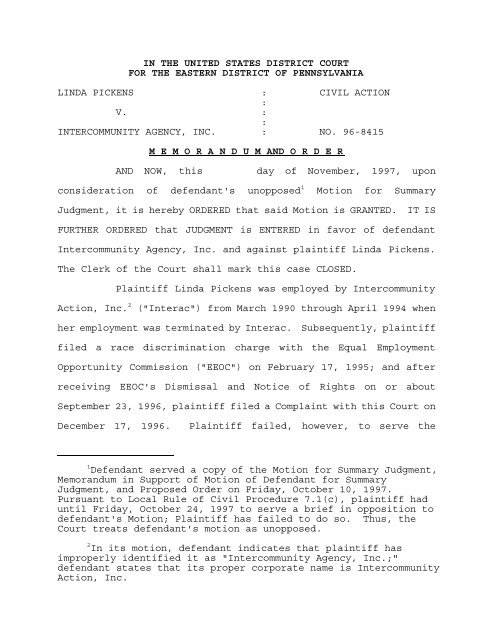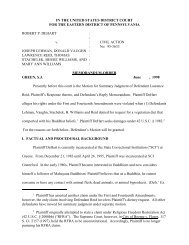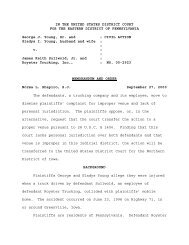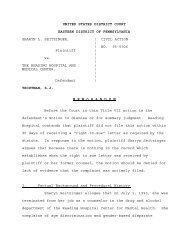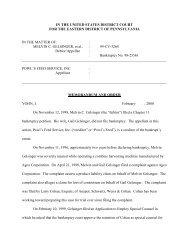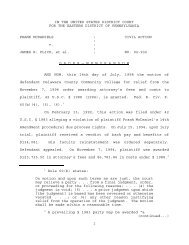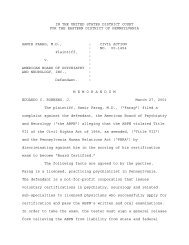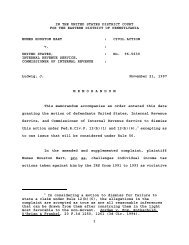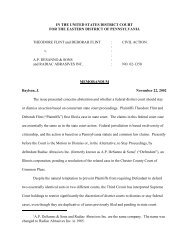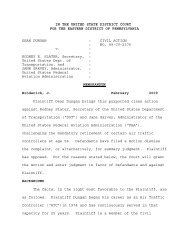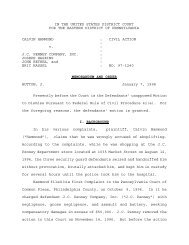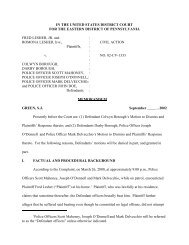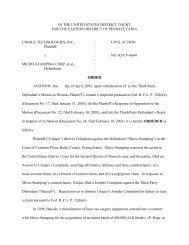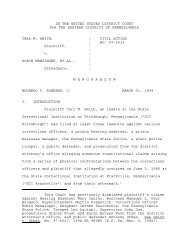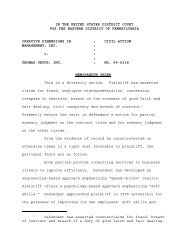1Defendant served a copy of the Motion for Summary Judgment ...
1Defendant served a copy of the Motion for Summary Judgment ...
1Defendant served a copy of the Motion for Summary Judgment ...
Create successful ePaper yourself
Turn your PDF publications into a flip-book with our unique Google optimized e-Paper software.
IN THE UNITED STATES DISTRICT COURT<br />
FOR THE EASTERN DISTRICT OF PENNSYLVANIA<br />
LINDA PICKENS : CIVIL ACTION<br />
:<br />
V. :<br />
:<br />
INTERCOMMUNITY AGENCY, INC. : NO. 96-8415<br />
M E M O R A N D U M AND O R D E R<br />
AND NOW, this day <strong>of</strong> November, 1997, upon<br />
consideration <strong>of</strong> defendant's unopposed 1 <strong>Motion</strong> <strong>for</strong> <strong>Summary</strong><br />
<strong>Judgment</strong>, it is hereby ORDERED that said <strong>Motion</strong> is GRANTED. IT IS<br />
FURTHER ORDERED that JUDGMENT is ENTERED in favor <strong>of</strong> defendant<br />
Intercommunity Agency, Inc. and against plaintiff Linda Pickens.<br />
The Clerk <strong>of</strong> <strong>the</strong> Court shall mark this case CLOSED.<br />
Plaintiff Linda Pickens was employed by Intercommunity<br />
Action, Inc. 2<br />
("Interac") from March 1990 through April 1994 when<br />
her employment was terminated by Interac. Subsequently, plaintiff<br />
filed a race discrimination charge with <strong>the</strong> Equal Employment<br />
Opportunity Commission ("EEOC") on February 17, 1995; and after<br />
receiving EEOC's Dismissal and Notice <strong>of</strong> Rights on or about<br />
September 23, 1996, plaintiff filed a Complaint with this Court on<br />
December 17, 1996.<br />
Plaintiff failed, however, to serve <strong>the</strong><br />
1 Defendant <strong>served</strong> a <strong>copy</strong> <strong>of</strong> <strong>the</strong> <strong>Motion</strong> <strong>for</strong> <strong>Summary</strong> <strong>Judgment</strong>,<br />
Memorandum in Support <strong>of</strong> <strong>Motion</strong> <strong>of</strong> Defendant <strong>for</strong> <strong>Summary</strong><br />
<strong>Judgment</strong>, and Proposed Order on Friday, October 10, 1997.<br />
Pursuant to Local Rule <strong>of</strong> Civil Procedure 7.1(c), plaintiff had<br />
until Friday, October 24, 1997 to serve a brief in opposition to<br />
defendant's <strong>Motion</strong>; Plaintiff has failed to do so. Thus, <strong>the</strong><br />
Court treats defendant's motion as unopposed.<br />
2 In its motion, defendant indicates that plaintiff has<br />
improperly identified it as "Intercommunity Agency, Inc.;"<br />
defendant states that its proper corporate name is Intercommunity<br />
Action, Inc.
Complaint within <strong>the</strong> 120-day period provided <strong>for</strong> in Rule 4(m)<br />
<strong>of</strong><br />
<strong>the</strong> Federal Rules <strong>of</strong> Civil Procedure. Instead, on April 23, 1997,<br />
more than 120 days after filing <strong>the</strong> Complaint, plaintiff filed an<br />
Amended Complaint. Plaintiff <strong>served</strong> <strong>the</strong> Amended Complaint on<br />
Interac on April 24, 1997.<br />
In her Amended Complaint, plaintiff alleges that she was<br />
terminated from her position at Interac, and was o<strong>the</strong>rwise treated<br />
disparately while employed at Interac, based on her race and sex in<br />
violation <strong>of</strong> her rights under Title VII <strong>of</strong> <strong>the</strong> Civil Rights Act <strong>of</strong><br />
1964 ("Title VII"), 42 U.S.C. § 2000e et seq., <strong>the</strong> Civil Rights Act<br />
<strong>of</strong> 1866 ("Section 1981"), 42 U.S.C. § 1981, and <strong>the</strong> Pennsylvania<br />
Human Relations Act ("PHRA"), 43 Pa. Stat. § 951. Plaintiff also<br />
cites <strong>the</strong> Age Discrimination in Employment Act ("ADEA"), 29 U.S.C.<br />
§ 623, in her description <strong>of</strong> <strong>the</strong> "nature <strong>of</strong> <strong>the</strong> action," but does<br />
not refer to <strong>the</strong> ADEA as a basis <strong>for</strong> this Court's jurisdiction,<br />
citing only to Title VII and Section 1981 in that regard. (Pl.'s<br />
Am. Compl. 1, 5).<br />
Plaintiff does not allege that <strong>the</strong> PHRA<br />
proscription against age discrimination was violated. She alleges<br />
only race and sex discrimination under that statute. There is but<br />
a single reference to age discrimination in <strong>the</strong> Amended Complaint,<br />
that being in Count IV, "Breach <strong>of</strong> Written and Implied Contract<br />
Claim," where she alludes to "<strong>the</strong> <strong>for</strong>egoing age discrimination and<br />
breach <strong>of</strong> policies" as <strong>the</strong> cause <strong>of</strong> harm to her. Nowhere in <strong>the</strong><br />
Amended Complaint, however, is <strong>the</strong>re any factual allegation<br />
concerning age discrimination. Indeed, <strong>the</strong>re exist no allegations<br />
that plaintiff was within <strong>the</strong> protected age group under ADEA<br />
and<br />
2
<strong>the</strong> PHRA at <strong>the</strong> times relevant to this action, as her age is not<br />
averred.<br />
Similarly, plaintiff describes <strong>the</strong> nature <strong>of</strong> her action<br />
as one including "employment discrimination based on disability". 3<br />
The lone factual allegation in this regard appears in Paragraph 2<br />
<strong>of</strong> <strong>the</strong> Amended Complaint, where plaintiff identifies herself as an<br />
"African American female . . . who has and who had a disability at<br />
all times relevant . . . ." (Pl.'s Am. Compl. 2). Conspicuously<br />
missing from <strong>the</strong> Amended Complaint are any allegations as to <strong>the</strong><br />
nature <strong>of</strong> her disability, that she was a "qualified individual with<br />
a disability" within <strong>the</strong> protection <strong>of</strong> <strong>the</strong> ADA, 42 U.S.C. §<br />
12112(a), that Interac knew <strong>of</strong> her disability, or as to how Interac<br />
purportedly discriminated against her on <strong>the</strong> basis <strong>of</strong> such<br />
disability.<br />
Plaintiff has also asserted vaguely that Interac<br />
treated her disparately "in retaliation <strong>for</strong> [her] engaging in<br />
statutorily protected activities," without anywhere specifying<br />
those activities or Interac's awareness <strong>of</strong> <strong>the</strong>m. (Pl.'s Am. Compl.<br />
12, 14, 22, 31, 32). Finally, plaintiff also claims that she<br />
entered into an oral and/or written contract with Interac, which<br />
was subsequently breached by Interac. Plaintiff seeks various<br />
<strong>for</strong>ms <strong>of</strong> relief, including but not limited to back pay, damages <strong>for</strong><br />
mental suffering, punitive damages, and costs and attorney's fees.<br />
Presently be<strong>for</strong>e <strong>the</strong> Court is Interac's motion <strong>for</strong><br />
3 Although plaintiff does not cite <strong>the</strong> Americans With<br />
Disabilities Act ("ADA"), 42 U.S.C. § 12101, in her Amended<br />
Complaint, <strong>the</strong> Court assumes that plaintiff proceeds under <strong>the</strong><br />
ADA.<br />
3
summary judgment. Interac argues that summary judgment should be<br />
entered in its favor on all Counts <strong>of</strong> plaintiff's Amended Complaint<br />
because: (1) plaintiff failed to exhaust her administrative<br />
remedies as to all <strong>of</strong> her claims <strong>of</strong> discrimination under Title VII,<br />
except <strong>for</strong> her claim that she was discharged because <strong>of</strong> her race;<br />
(2) <strong>the</strong> original Complaint, not having been <strong>served</strong> on Interac<br />
within 120 days <strong>of</strong> its filing, should be dismissed, or<br />
alternatively, plaintiff is barred from filing an Amended Complaint<br />
that relates back to <strong>the</strong> original Complaint; (3) plaintiff's claims<br />
under Section 1981 are barred by <strong>the</strong> statute <strong>of</strong> limitations; (4)<br />
plaintiff's<br />
claims under <strong>the</strong> PHRA are barred by her failure to<br />
exhaust administrative remedies; (5) under applicable Pennsylvania<br />
state law, <strong>the</strong>re is no cause <strong>of</strong> action <strong>for</strong> wrongful discharge; and<br />
(6) <strong>the</strong> only operative employment contract here was a collective<br />
bargaining agreement under <strong>the</strong> terms <strong>of</strong> which plaintiff cannot now<br />
pursue a claim that she was terminated <strong>for</strong> o<strong>the</strong>r than just cause.<br />
Plaintiff<br />
has not filed a response to defendant's <strong>Motion</strong> <strong>for</strong><br />
<strong>Summary</strong> <strong>Judgment</strong>.<br />
For <strong>the</strong> following reasons, <strong>the</strong> Court grants<br />
defendant's <strong>Motion</strong>.<br />
A reviewing court may enter summary judgment where <strong>the</strong>re<br />
are no genuine issues as to any material fact and one party is<br />
entitled to judgment as a matter <strong>of</strong> law.<br />
White v. Westinghouse<br />
Electric Co., 862 F.2d 56, 59 (3d Cir. 1988).<br />
"The inquiry is<br />
whe<strong>the</strong>r <strong>the</strong> evidence presents a sufficient disagreement to require<br />
submission to <strong>the</strong> jury or whe<strong>the</strong>r it is so one sided that one party<br />
must, as a matter <strong>of</strong> law, prevail over <strong>the</strong> o<strong>the</strong>r." Anderson v.<br />
4
Liberty Lobby, Inc., 477 U.S. 242, 249 (1986). The evidence<br />
presented must be viewed in <strong>the</strong> light most<br />
favorable to <strong>the</strong> nonmoving<br />
party. Id. at 59.<br />
The moving party has <strong>the</strong> initial burden <strong>of</strong> identifying<br />
evidence which it believes shows an absence <strong>of</strong> a genuine issue <strong>of</strong><br />
material fact. Celotex Corp. v. Catrett, 477 U.S. 317, 324 (1986);<br />
Childers v. Joseph, 842 F.2d 689, 694 (3d Cir. 1988). The moving<br />
party's burden may be discharged by demonstrating that <strong>the</strong>re is an<br />
absence <strong>of</strong> evidence to support <strong>the</strong> non-moving party's case.<br />
Celotex, 477 U.S. at 325.<br />
Once <strong>the</strong> moving party satisfies its<br />
burden, <strong>the</strong> burden shifts to <strong>the</strong> non-moving party, who must go<br />
beyond its pleading and designate specific facts by use <strong>of</strong><br />
affidavits, depositions, admissions, or answers to interrogatories<br />
showing <strong>the</strong>re is a genuine issue <strong>for</strong> trial.<br />
Id. at 324. Moreover,<br />
when <strong>the</strong> non-moving party bears <strong>the</strong> burden <strong>of</strong> pro<strong>of</strong>, it must "make<br />
a showing sufficient to establish <strong>the</strong> existence <strong>of</strong> [every] element<br />
essential to that party's case." Equimark Commercial Fin. Co. v.<br />
C.I.T. Fin. Servs. Corp., 812 F.2d 141, 144 (3d Cir. 1987) (quoting<br />
Celotex, 477 U.S. at 322).<br />
<strong>Summary</strong> judgment must be granted "against a party who<br />
fails to make a showing sufficient to establish <strong>the</strong> existence <strong>of</strong> an<br />
element essential to that party's case, and on which that party<br />
will bear <strong>the</strong> burden <strong>of</strong> pro<strong>of</strong> at trial." White, 862 F.2d at 59<br />
(quoting Celotex, 477 U.S. at 322). The non-movant must<br />
specifically identify evidence <strong>of</strong> record, as opposed to general<br />
averments, which supports his claim and upon which a reasonable<br />
5
jury could base a verdict in his favor. Celotex, 477 U.S. at 322.<br />
The non-movant cannot avoid summary judgment by substituting<br />
"conclusory allegations <strong>of</strong> <strong>the</strong> complaint . . . with conclusory<br />
allegations <strong>of</strong> an affidavit."<br />
Lujan v. National Wildlife Found.,<br />
497 U.S. 871, 888 (1990). Ra<strong>the</strong>r, <strong>the</strong> motion must be denied only<br />
when "facts specifically averred by [<strong>the</strong> non-movant] contradict<br />
"facts specifically averred by <strong>the</strong> movant." Id. Applying <strong>the</strong>se<br />
principles to <strong>the</strong> facts here, <strong>the</strong> Court finds that defendant is<br />
entitled to judgment as a matter <strong>of</strong> law.<br />
To <strong>the</strong> extent that plaintiff has stated an ADEA claim,<br />
this claim is barred because plaintiff has not complied with<br />
<strong>the</strong><br />
ADEA's charge-filing requirements. Under <strong>the</strong> ADEA, no civil action<br />
can be commenced until 60 days after a charge alleging unlawful age<br />
discrimination has been filed with <strong>the</strong> EEOC.<br />
Cline v. General<br />
Elec. Credit Auto Lease, Inc., 748 F. Supp. 650, 653 (N.D. Ill.<br />
1990); 29 U.S.C. § 626(d). This requirement promotes three goals:<br />
first, <strong>the</strong> EEOC can notify <strong>the</strong> complainant's employer; second, <strong>the</strong><br />
EEOC has an opportunity to investigate <strong>the</strong> charge; and third, <strong>the</strong><br />
EEOC can attempt conciliation between <strong>the</strong> parties. Id. If a<br />
plaintiff has failed to first file a charge with <strong>the</strong> EEOC, <strong>the</strong>n <strong>the</strong><br />
plaintiff cannot proceed with a civil action because <strong>of</strong> failure to<br />
exhaust administrative remedies.<br />
Here, <strong>the</strong> EEOC charge filed by plaintiff does not<br />
directly or indirectly accuse <strong>the</strong> defendant <strong>of</strong> age discrimination.<br />
Plaintiff neglected to check <strong>the</strong> box on <strong>the</strong> charge <strong>for</strong>m <strong>for</strong> age<br />
discrimination, and nei<strong>the</strong>r <strong>the</strong> term "age discrimination," nor<br />
6
words to that effect appear in <strong>the</strong> charge. While plaintiff could<br />
validly bring an ADEA claim if it were "like or reasonably related<br />
to <strong>the</strong> allegations <strong>of</strong> [her] charge and growing out <strong>of</strong> such<br />
allegations," Jenkins v. Blue Cross Mut. Hosp. Ins., Inc., 538 F.2d<br />
164, 167 (7th Cir. 1976) (en banc), this Court is hard-pressed on<br />
<strong>the</strong> facts to find a reasonable relationship between an allegation<br />
<strong>of</strong> race discrimination and one <strong>of</strong> age discrimination. Indeed, in<br />
<strong>the</strong> Charge <strong>of</strong> Discrimination that plaintiff filed with <strong>the</strong> EEOC,<br />
plaintiff only complained <strong>of</strong> her discharge which allegedly was <strong>the</strong><br />
result <strong>of</strong> discrimination based on race. Simply stated, plaintiff<br />
never complained about age discrimination until <strong>the</strong> filing <strong>of</strong> this<br />
civil action. Thus, <strong>the</strong> Court grants summary judgment in favor <strong>of</strong><br />
defendant on Count I <strong>of</strong> plaintiff's Amended Complaint to <strong>the</strong> extent<br />
it alleges an ADEA claim.<br />
The<br />
Court also grants summary judgment in favor <strong>of</strong><br />
defendant on Count I to <strong>the</strong> extent that plaintiff alleges an ADA<br />
claim. Like Title VII and <strong>the</strong> ADEA, <strong>the</strong> ADA requires a prospective<br />
plaintiff to file a charge <strong>of</strong> discrimination with <strong>the</strong> EEOC, setting<br />
<strong>for</strong>th <strong>the</strong> alleged ADA claim, be<strong>for</strong>e commencing suit in federal<br />
court. 42 U.S.C. § 12117(a). Here, it is clear that plaintiff<br />
failed to allege an ADA claim. Nowhere in her Charge <strong>of</strong><br />
Discrimination does plaintiff allege that she was discriminated<br />
against based on a disability. Although a judicial complaint is<br />
not limited to <strong>the</strong> scope <strong>of</strong> <strong>the</strong> four corners <strong>of</strong><br />
<strong>the</strong> EEOC charge,<br />
and "'<strong>the</strong> parameters <strong>of</strong> <strong>the</strong> civil action in <strong>the</strong> district court are<br />
defined by <strong>the</strong> scope <strong>of</strong> <strong>the</strong> EEOC investigation which can reasonably<br />
7
e expected to grow out <strong>of</strong> <strong>the</strong> charge <strong>of</strong> discrimination,'" Doe v.<br />
Kohn Nast & Graf, P.C., 866 F. Supp. 190, 196 (E.D Pa. 1994)<br />
(citation omitted), plaintiff did not allege any facts in her EEOC<br />
charge that would have caused <strong>the</strong> EEOC to investigate a possible<br />
ADA claim. Thus, <strong>the</strong> Court grants summary judgment in defendant's<br />
favor on Count I to <strong>the</strong> extent that plaintiff alleges an ADA claim.<br />
The Court also grants summary judgment in favor <strong>of</strong><br />
defendant on Count I to <strong>the</strong> extent that plaintiff asserts claims <strong>of</strong><br />
sex discrimination under Title VII. Under Title VII, it is now<br />
axiomatic that a complainant must file a charge <strong>of</strong> discrimination<br />
with <strong>the</strong> EEOC be<strong>for</strong>e filing suit in federal court. Ostapowicz v.<br />
Johnson Bronze Co., 541 F.2d 394, 398-99 (3d Cir. 1976).<br />
If a<br />
plaintiff in federal court has failed to file his or her specific<br />
charge <strong>of</strong> discrimination with <strong>the</strong> EEOC be<strong>for</strong>e filing a lawsuit in<br />
federal court, <strong>the</strong>n plaintiff cannot proceed with his or her claim<br />
in federal court.<br />
The Third Circuit has stated that: "<strong>the</strong> parameters <strong>of</strong> <strong>the</strong><br />
civil action in <strong>the</strong> district court are defined by <strong>the</strong> scope <strong>of</strong> <strong>the</strong><br />
EEOC investigation which can reasonably be expected to grow out <strong>of</strong><br />
<strong>the</strong> charge <strong>of</strong> discrimination." Id. (citation omitted). In<br />
determining whe<strong>the</strong>r <strong>the</strong> judicial claim is reasonably related to <strong>the</strong><br />
EEOC charge, <strong>the</strong> most important consideration is <strong>the</strong> factual<br />
statement.<br />
Doe, 866 F. Supp. at 197. There<strong>for</strong>e, a plaintiff may<br />
file a particular charge <strong>of</strong> discrimination in federal court if <strong>the</strong><br />
EEOC's investigation should have covered <strong>the</strong> charge <strong>of</strong><br />
discrimination based on <strong>the</strong> factual statement provided to <strong>the</strong> EEOC.<br />
8
In this case, plaintiff simply cannot argue that <strong>the</strong><br />
scope <strong>of</strong> <strong>the</strong> EEOC investigation should have covered a charge <strong>of</strong><br />
sexual discrimination. Plaintiff filed a Charge <strong>of</strong> Discrimination<br />
with <strong>the</strong> EEOC, wherein she only alleged that she was discharged<br />
because <strong>of</strong> her race.<br />
No o<strong>the</strong>r facts were provided to <strong>the</strong> EEOC<br />
which should have prompted <strong>the</strong> EEOC to investigate claims <strong>of</strong> sexual<br />
discrimination. Indeed, plaintiff does not even argue that <strong>the</strong><br />
EEOC should have been expected to investigate a claim <strong>of</strong> sexual<br />
discrimination based on <strong>the</strong> facts provided to <strong>the</strong> EEOC. Thus, <strong>the</strong><br />
Court grants summary judgment in favor <strong>of</strong> defendant on Count I to<br />
<strong>the</strong> extent that plaintiff asserts a sexual discrimination claim<br />
under Title VII.<br />
The Court also finds that plaintiff cannot base her<br />
racial discrimination claim on any conduct <strong>of</strong> her employer o<strong>the</strong>r<br />
than her discharge. As stated previously, a district court may<br />
adjudicate only those claims that fall within "<strong>the</strong> scope <strong>of</strong> <strong>the</strong><br />
EEOC investigation which can reasonably be expected to grow out <strong>of</strong><br />
<strong>the</strong> charge <strong>of</strong> discrimination." Ostapowicz, 541 F.2d at 398-399.<br />
A comparison <strong>of</strong> plaintiff's Charge <strong>of</strong> Discrimination filed with <strong>the</strong><br />
EEOC and her Amended Complaint indicates that plaintiff failed to<br />
raise, in her EEOC charge, <strong>the</strong> allegations averred in Paragraphs<br />
12, 13, 15, 16, 17, 18 and 19 <strong>of</strong> her Amended Complaint. Thus, this<br />
Court does not have subject matter jurisdiction over plaintiff's<br />
Title VII claims as alleged in Paragraphs 12, 13, 15, 16, 17, 18,<br />
and 19 <strong>of</strong> <strong>the</strong> Amended Complaint because plaintiff has failed to<br />
exhaust administrative remedies. See King v. M.R. Brown, Inc., 911<br />
9
F. Supp. 161, 164-66 (E.D. Pa. 1995).<br />
In her Amended Complaint, plaintiff alleges differential<br />
terms and conditions <strong>of</strong> employment because <strong>of</strong> her race and sex and<br />
in retaliation <strong>for</strong> engaging in statutorily protected activities;<br />
plaintiff claims that such differential terms and conditions<br />
consisted <strong>of</strong> racial and sexual harassment, excessive criticism, and<br />
a hostile work environment. (Pl.'s Am. Compl. 12, 13, 15).<br />
Plaintiff also alleges that she was denied job training <strong>for</strong> a<br />
"better job" because <strong>of</strong> her race and sex and in retaliation <strong>for</strong><br />
statutorily protected activities. (Pl.'s Am. Compl. 15, 16).<br />
Finally, plaintiff claims that she was given improper evaluations<br />
and severe criticism <strong>of</strong> her job per<strong>for</strong>mance and disparate<br />
discipline prior to her discharge based on her race and sex.<br />
(Pl.'s Am. Compl. 17-19).<br />
All <strong>of</strong> <strong>the</strong>se allegations are not properly part <strong>of</strong> this<br />
action. These allegations, which state different claims <strong>of</strong> racial<br />
discrimination not previously raised with <strong>the</strong> EEOC, are nei<strong>the</strong>r<br />
related to plaintiff's charge <strong>of</strong> racial discrimination in her<br />
discharge, nor likely to have been included in <strong>the</strong> EEOC's<br />
investigation <strong>of</strong> plaintiff's charge because <strong>the</strong>y are in no way<br />
related to her claim <strong>of</strong> racial discrimination in her discharge. To<br />
find o<strong>the</strong>rwise would frustrate Title VII's preference <strong>for</strong><br />
investigation and conciliation by <strong>the</strong> EEOC over <strong>for</strong>mal<br />
adjudication, as well as deprive <strong>the</strong> charged party <strong>of</strong> notice <strong>of</strong> <strong>the</strong><br />
allegations raised against it.<br />
See EEOC v. E.I. duPont de Nemours<br />
& Co., 516 F.2d 1297 (3d Cir. 1975). Thus, <strong>the</strong> Court grants<br />
10
summary judgment in favor <strong>of</strong> defendant and against plaintiff as to<br />
Paragraphs 12, 13, 15, 16, 17, 18, and 19 <strong>of</strong> <strong>the</strong> Amended Complaint.<br />
The Court also must dismiss plaintiff's remaining Title<br />
VII claim - that she was dismissed from her employment with Interac<br />
because <strong>of</strong> her race - because she failed to timely file her Title<br />
VII claim.<br />
Under Title VII, an individual has ninety days from<br />
receipt <strong>of</strong> an EEOC right-to-sue letter to bring a Title VII claim<br />
in federal court. 42 U.S.C. § 2000e-5(f)(1). In this case,<br />
plaintiff received her right-to-sue letter on or about September<br />
23, 1996 and commenced this action on or about December 17, 1996 by<br />
<strong>the</strong> filing <strong>of</strong> <strong>the</strong> original Complaint. Thus, it appears<br />
superficially that plaintiff properly commenced this action within<br />
ninety days from receipt <strong>of</strong> her right-to-sue letter. However, a<br />
review<br />
<strong>of</strong> <strong>the</strong> docket indicates that plaintiff never <strong>served</strong> <strong>the</strong><br />
original Complaint on defendant. Instead, plaintiff filed an<br />
Amended Complaint on April 23, 1997, more than 120 days from <strong>the</strong><br />
filing <strong>of</strong> <strong>the</strong> original Complaint, and <strong>served</strong> this Amended Complaint<br />
on April 24, 1997. Despite <strong>the</strong> filing and service <strong>of</strong> her Amended<br />
Complaint, plaintiff's Title VII action is timed-barred because it<br />
was never properly commenced within ninety days from receipt <strong>of</strong> her<br />
right-to-sue letter.<br />
Rule 4(m) <strong>of</strong> <strong>the</strong> Federal Rules <strong>of</strong> Civil Procedure states:<br />
If service <strong>of</strong> <strong>the</strong> summons and <strong>the</strong> complaint is not made upon<br />
a defendant within 120 days after <strong>the</strong> filing <strong>of</strong> <strong>the</strong> complaint,<br />
<strong>the</strong> court, upon motion or on its own initiative after notice<br />
to <strong>the</strong> plaintiff, shall dismiss <strong>the</strong> action without prejudice<br />
as to that defendant or direct that service be effected within<br />
11
a specified time; provided that if <strong>the</strong> plaintiff shows good<br />
cause <strong>for</strong> <strong>the</strong> failure, <strong>the</strong> court shall extend <strong>the</strong> time <strong>for</strong><br />
service <strong>for</strong> an appropriate period.<br />
Fed. R. Civ. P. 4(m). In Petrucelli v. Bohringer and Ratzinger, 46<br />
F.3d 1298, 1305 (3d Cir. 1995), <strong>the</strong> Third Circuit found that Rule<br />
4(m) establishes a two-stage test: "[f]irst, <strong>the</strong> district court<br />
should determine whe<strong>the</strong>r good cause exists <strong>for</strong> an extension <strong>of</strong> time<br />
[to serve <strong>the</strong> complaint]. If good cause is present, <strong>the</strong> district<br />
court must extend time <strong>for</strong> service and <strong>the</strong> inquiry is ended. If,<br />
however, good cause does not exist, <strong>the</strong> court may in its discretion<br />
decide whe<strong>the</strong>r to dismiss <strong>the</strong> case without prejudice or extend time<br />
<strong>for</strong> service." Id.<br />
Regarding guidance <strong>for</strong> a district court's exercise <strong>of</strong><br />
discretion under this Rule, <strong>the</strong> Petrucelli court discussed <strong>the</strong><br />
Advisory Committee's explanation that "'[r]elief may be justified,<br />
<strong>for</strong> example, if <strong>the</strong> applicable statute <strong>of</strong> limitations would bar <strong>the</strong><br />
refiled action, or if <strong>the</strong> defendant is evading service or conceals<br />
a defect in attempted service.'" Id. at 1305-06. The Third<br />
Circuit,<br />
however, took great pains to explain that it did not<br />
interpret <strong>the</strong> Advisory Committee's comment regarding a statute <strong>of</strong><br />
limitations problem as designating such to constitute good cause<br />
requiring an extension <strong>of</strong> time <strong>for</strong> service, or as mandating <strong>the</strong><br />
district<br />
court to reach that result in <strong>the</strong> exercise <strong>of</strong> its<br />
discretion. Id. at 1306 n.7. Indeed, <strong>the</strong> Court recognized that<br />
"holding that good cause exists any time <strong>the</strong> statute <strong>of</strong> limitations<br />
has run would effectively eviscerate Rule 4(m) and defeat <strong>the</strong><br />
purpose and bar <strong>of</strong> statutes <strong>of</strong> repose."<br />
Id. And in its holding,<br />
12
<strong>the</strong> Circuit explained:<br />
We emphasize that <strong>the</strong> running <strong>of</strong> <strong>the</strong> statute <strong>of</strong> limitations<br />
does not require <strong>the</strong> district court to extend time <strong>for</strong> service<br />
<strong>of</strong> process. Ra<strong>the</strong>r, absent finding <strong>of</strong> good cause, a district<br />
court may in its discretion still dismiss <strong>the</strong> case, even after<br />
considering that <strong>the</strong> statute <strong>of</strong> limitations has run and <strong>the</strong><br />
refiling <strong>of</strong> an action is barred.<br />
Id. at 1306.<br />
Satisfying <strong>the</strong> first step in <strong>the</strong> Petrucelli test, <strong>the</strong><br />
Court finds that plaintiff cannot establish <strong>the</strong> "good cause"<br />
required to warrant an extension <strong>of</strong> <strong>the</strong> 120 days to serve <strong>the</strong><br />
original Complaint. To begin, <strong>the</strong> Court first notes that plaintiff<br />
has completely failed to file any response to defendant's instant<br />
<strong>Motion</strong>; 4<br />
thus, plaintiff does not even present this Court with a<br />
"good cause" argument.<br />
Even if plaintiff had responded to<br />
defendant's <strong>Motion</strong>, she would be hard-pressed to establish good<br />
cause in light <strong>of</strong> <strong>the</strong> following facts. Plaintiff was represented<br />
by counsel throughout this proceeding. Interac's <strong>of</strong>fices have been<br />
at <strong>the</strong> same address in Philadelphia <strong>for</strong> years, so <strong>the</strong>re can be no<br />
question where it could be found <strong>for</strong> service. Indeed, plaintiff<br />
effected service <strong>of</strong> <strong>the</strong> Amended Complaint <strong>the</strong> day after filing it.<br />
In addition, <strong>the</strong> Court notes that plaintiff's counsel should be<br />
well aware <strong>of</strong> Rule 4(m)'s requirements. In Momah v. Albert<br />
4 The Court recognizes that plaintiff, by way <strong>of</strong> letter<br />
correspondence, asked this Court <strong>for</strong> an extension <strong>of</strong> time to<br />
respond to defendant's <strong>Motion</strong>. However, this Court, by way <strong>of</strong><br />
letter, in<strong>for</strong>med plaintiff that it does not entertain matters<br />
that should properly be <strong>the</strong> subject <strong>of</strong> motion practice. Despite<br />
this letter, plaintiff has not, as <strong>of</strong> <strong>the</strong> date <strong>of</strong> this opinion,<br />
filed a response to defendant's <strong>Motion</strong>, or <strong>for</strong> that matter, even<br />
filed a <strong>for</strong>mal motion <strong>for</strong> extension <strong>of</strong> time to respond.<br />
13
Einstein Medical Center, 158 F.R.D. 66 (E.D. Pa. 1994) (Joyner,<br />
J.), <strong>the</strong> court dismissed <strong>the</strong> complaint <strong>for</strong> failure <strong>of</strong> timely<br />
service when Mr. Marshall Williams had it <strong>served</strong> one day after <strong>the</strong><br />
expiration <strong>of</strong> <strong>the</strong> 120-day period. Judge Joyner found <strong>the</strong> failure<br />
<strong>of</strong> service to have been caused by Mr. Williams' lack <strong>of</strong> diligence,<br />
as well as his pr<strong>of</strong>essional neglect.<br />
Id. at 69. Likewise, here,<br />
<strong>the</strong>re has been no timely ef<strong>for</strong>t whatsoever to serve <strong>the</strong> original<br />
Complaint filed on December 17, 1996 and <strong>the</strong> summons issued <strong>the</strong><br />
following day. Indeed, <strong>the</strong> original Complaint and summons have<br />
never been <strong>served</strong>. Based on <strong>the</strong>se facts, it is clear that<br />
plaintiff cannot demonstrate good cause <strong>for</strong> failure to timely serve<br />
<strong>the</strong> original Complaint.<br />
Under <strong>the</strong> Petrucelli test, <strong>the</strong> Court must now determine<br />
whe<strong>the</strong>r to exercise its discretion to permit plaintiff additional<br />
time to serve <strong>the</strong> original Complaint. Although <strong>the</strong> Third Circuit<br />
did not enumerate <strong>the</strong> factors that are relevant to a district<br />
court's exercise <strong>of</strong> discretion under Rule 4(m) in Petrucelli, it<br />
recently, in Boley v. Kaymark, 123 F.3d 756, 759-60 (3d Cir. 1997),<br />
cited United States v. Monaco, 23 F.3d 793 (3d Cir. 1994) and Lieb<br />
v. Topstone Indus., Inc., 788 F.2d 151 (3d Cir. 1986) <strong>for</strong> <strong>the</strong><br />
purpose <strong>of</strong> highlighting <strong>the</strong> factors that a district court should<br />
consider when it exercises its discretion. In this regard, <strong>the</strong><br />
Lieb court has enumerated <strong>the</strong> following factors: (1) frivolousness;<br />
(ii) motivation; (iii) objective unreasonableness (both in <strong>the</strong><br />
factual and <strong>the</strong> legal components <strong>of</strong> <strong>the</strong> case); and (iv) <strong>the</strong> need in<br />
particular circumstances to advance consideration <strong>of</strong> compensation<br />
14
and deterrence. Lieb, 788 F.2d at 156.<br />
To <strong>the</strong> extent that <strong>the</strong>se factors can be applied here, <strong>the</strong><br />
Court finds that <strong>the</strong>se factors militate against granting plaintiff<br />
an extension <strong>of</strong> time to file her original Complaint. First, as is<br />
apparent from this Court's discussion, plaintiff's claims appear to<br />
be frivolous. Second, as to plaintiff's motivation in prosecuting<br />
this action, she has been less than diligent in prosecuting her<br />
claim. Until this suit, plaintiff had never raised any claim <strong>of</strong><br />
discrimination or o<strong>the</strong>r breach by Interac associated with her<br />
employment o<strong>the</strong>r than with respect to her discharge. And, with<br />
respect to plaintiff's discharge claim, she has prosecuted this<br />
claim with less than alacrity. Third, as to <strong>the</strong> objective<br />
reasonableness <strong>of</strong> her claims, <strong>the</strong> EEOC after a full investigation<br />
has found no cause to believe that Interac discharged plaintiff<br />
because <strong>of</strong> her race; plaintiff's union did not pursue her claim in<br />
arbitration, and <strong>the</strong> National Labor Relations Board's Regional<br />
Director and General Counsel found that <strong>the</strong> union acted properly in<br />
this regard. Plaintiff has also failed to produce any evidence in<br />
this action<br />
that she was <strong>the</strong> subject <strong>of</strong> racial discrimination;<br />
indeed, plaintiff has not even responded to defendant's <strong>Motion</strong>.<br />
Finally, plaintiff has failed to advance any argument as to why she<br />
should be given more time to file her original Complaint; plaintiff<br />
has demonstrated complete disregard <strong>for</strong> her case.<br />
The only factor that weighs in favor <strong>of</strong> granting an<br />
extension <strong>of</strong> time in which plaintiff could serve her original<br />
Complaint is that <strong>the</strong> statute <strong>of</strong> limitations has run <strong>for</strong> her Title<br />
15
VII claim. However, district courts "retain[] discretion to refuse<br />
to extend time, even if <strong>the</strong> statute <strong>of</strong> limitations has run."<br />
Boley, 123 F.3d at 759.<br />
In this case, plaintiff surely is not<br />
entitled to any extension <strong>of</strong> time. Plaintiff has not requested an<br />
extension <strong>of</strong> time, nor has she even filed a response to defendant's<br />
motion <strong>for</strong> summary judgment. Plaintiff has shown utter disregard<br />
<strong>for</strong> her claim. Consequently, <strong>the</strong> Court will not extend <strong>the</strong> time in<br />
which plaintiff can serve <strong>the</strong> original Complaint. As a result,<br />
plaintiff has not properly commenced her Title VII action within<br />
ninety days from receipt <strong>of</strong> <strong>the</strong> EEOC right-to-sue<br />
letter. Thus,<br />
her action is time-barred.<br />
The filing <strong>of</strong> <strong>the</strong> Amended Complaint does not save<br />
plaintiff's Title VII claim. First, although some courts have held<br />
that service <strong>of</strong> an amended complaint within 120 days <strong>of</strong> filing suit<br />
is sufficient to satisfy Rule 4(m) when <strong>the</strong> original complaint has<br />
not been filed, Crossen v. Bernstein, 1994 WL 281881, at *8<br />
(S.D.N.Y. June 23, 1994); White v. Steak & Ale <strong>of</strong> Little Rock,<br />
Inc., 839 F. Supp. 23, 25 (E.D. Ark. 1993), <strong>the</strong> filing <strong>of</strong> <strong>the</strong><br />
amended<br />
complaint outside <strong>the</strong> original 120-day period will not<br />
satisfy <strong>the</strong> requirements <strong>of</strong> Rule 4(m). See Bakal v. Ambassador<br />
Construction, 1995 WL 447784, at *2 (S.D.N.Y. July 28, 1995). In<br />
this case, plaintiff filed and <strong>served</strong> <strong>the</strong> Amended Complaint without<br />
<strong>the</strong> 120-day period from <strong>the</strong> filing <strong>of</strong> <strong>the</strong> original Complaint; thus,<br />
<strong>the</strong> filing <strong>of</strong> <strong>the</strong> Amended Complaint does not satisfy <strong>the</strong><br />
requirements <strong>of</strong> Rule 4(m).<br />
In addition, <strong>the</strong> relation back doctrine <strong>of</strong> Rule 15 <strong>of</strong> <strong>the</strong><br />
16
Federal Rules <strong>of</strong> Civil Procedure does not save plaintiff's Title<br />
VII claim from <strong>the</strong> bar <strong>of</strong> <strong>the</strong> statute <strong>of</strong> limitations. Rule 15(c)<br />
governs <strong>the</strong> circumstances under which an amended complaint relates<br />
back to <strong>the</strong> original pleading. The rationale <strong>for</strong> Rule 15(c) has<br />
been described as "allow[ing] an amendment to relate<br />
back to <strong>the</strong><br />
filing <strong>of</strong> <strong>the</strong> original complaint where <strong>the</strong> defendant has been put<br />
on notice, through <strong>the</strong> pleadings or o<strong>the</strong>r sources, <strong>of</strong> <strong>the</strong> entire<br />
scope <strong>of</strong> <strong>the</strong> transaction or occurrence out <strong>of</strong> which <strong>the</strong> amended<br />
claims arise." Barcume v. City <strong>of</strong> Flint, 819 F. Supp. 631, 636<br />
(E.D. Mich. 1993). The critical element under Rule 15(c) is notice<br />
to <strong>the</strong> opposing party. Williams v. United States, 405 F.2d 234,<br />
236 (5th Cir. 1968). In this case, Interac did not receive notice<br />
<strong>of</strong> <strong>the</strong> conduct, transactions or occurrences concerning which<br />
plaintiff seeks to proceed because it was never <strong>served</strong> with <strong>the</strong><br />
original Complaint. Without such notice, <strong>the</strong>re can be no relation<br />
back <strong>of</strong> Plaintiff's Amended Complaint under Rule 15(c). Thus, <strong>the</strong><br />
relation back doctrine <strong>of</strong> Rule 15(c) does not operate to save<br />
plaintiff's o<strong>the</strong>rwise time-barred Title VII claim.<br />
The Court also finds that plaintiff's Section 1981 claim<br />
in Count II <strong>of</strong> <strong>the</strong> Amended Complaint is time-barred. Under<br />
Pennsylvania law, a plaintiff must file her Section 1981 claim<br />
within two years <strong>of</strong> <strong>the</strong> allegedly discriminatory conduct <strong>of</strong><br />
defendant. See Goodman v. Lukens Steel Co., 482 U.S. 656 (1987).<br />
In this case, <strong>the</strong> most recent date <strong>of</strong> discrimination alleged in <strong>the</strong><br />
Amended Complaint is April 26, 1994, <strong>the</strong> date <strong>of</strong> plaintiff's<br />
discharge by Interac. Plaintiff's original Complaint was filed on<br />
17
December 17, 1996. Clearly, all <strong>of</strong> plaintiff's claims <strong>of</strong> racial<br />
discrimination that are conceivably covered by Section 1981 were<br />
filed well beyond <strong>the</strong> two-year statute <strong>of</strong> limitations. Thus,<br />
summary judgment is entered in favor <strong>of</strong> defendant and against<br />
plaintiff on Count II.<br />
Plaintiff's PHRA claim, in Count III <strong>of</strong> her Amended<br />
Complaint, is barred by her failure to file a complaint <strong>of</strong><br />
discrimination with <strong>the</strong> Pennsylvania Human Rights Commission. In<br />
Woodson v. Scott Paper Co., 109 F.3d 913 (3d Cir. 1997), Judge<br />
Becker explained that to bring suit under <strong>the</strong> PHRA, a plaintiff<br />
must first file a complaint with <strong>the</strong> PHRC within 180 days <strong>of</strong><br />
<strong>the</strong><br />
alleged act <strong>of</strong> discrimination. Id. at 925 (citing 43 Pa. S. §§<br />
959(a), 962).<br />
In this case, plaintiff never filed a charge <strong>of</strong><br />
discrimination with <strong>the</strong> PHRC, nor did she request <strong>the</strong> EEOC to<br />
cross-file her Charge <strong>of</strong> Discrimination with <strong>the</strong> PHRC. As a<br />
result, plaintiff is barred from pursuing her PHRA claim in this<br />
judicial <strong>for</strong>um.<br />
Thus, summary judgment is entered in favor <strong>of</strong><br />
defendant and against plaintiff on Count III <strong>of</strong> plaintiff's Amended<br />
Complaint.<br />
The Court also finds that defendant is entitled to<br />
summary judgment on Counts IV and V <strong>of</strong> plaintiff's Amended<br />
Complaint. In Count IV, plaintiff claims that defendant breached<br />
an express and implied employment contract. In Count V, plaintiff<br />
asserts a wrongful discharge claim against defendant. The Court<br />
finds that both Counts are without merit.<br />
Under Pennsylvania law, employees are assumed to be<br />
18
employees at-will.<br />
Geary v. United States Steel Corp., 456 Pa.<br />
171, 319 A.2d 174 (1974). This means that any employer may at any<br />
time and <strong>for</strong> any reason dismiss an employee.<br />
Hershberger v. Jersey<br />
Shore Steel Co., 394 Pa. Super. 363, 575 A.2d 944 (1990). There<br />
exist, however, a limited number <strong>of</strong> statutory and common law<br />
exceptions to employment at will. The three exceptions are: (1)<br />
wrongful discharge based on discrimination, 43 Pa. Stat. § 951 et<br />
seq.; (2) wrongful discharge based on a public policy tort, Turner<br />
v. Letterkenny Federal Credit Union, 351 Pa. Super. 51, 55, 505<br />
A.2d 259, 261 (1985); and (3) wrongful discharge based on actual or<br />
implied contract.<br />
Banas v. Mat<strong>the</strong>ws International Corp., 348 Pa.<br />
Super. 464, 502 A.2d 637 (1985). None <strong>of</strong> <strong>the</strong>se exceptions apply in<br />
this case. Thus, <strong>the</strong> Court enters summary judgment in favor <strong>of</strong><br />
defendant and against plaintiff on Counts IV and V <strong>of</strong> plaintiff's<br />
Amended Complaint.<br />
To <strong>the</strong> extent plaintiff seeks to fall within <strong>the</strong> first<br />
exception - wrongful discharge based on discrimination, <strong>the</strong><br />
exclusive<br />
remedy is set <strong>for</strong>th in <strong>the</strong> PHRA and requires that a<br />
complaint be filed first with <strong>the</strong> PHRC. See supra. Similarly,<br />
<strong>the</strong>re is no common law action <strong>for</strong> wrongful discharge based on a<br />
violation <strong>of</strong> public policy where specific statutory remedies<br />
are<br />
available. The only state public policy plaintiff claims to have<br />
been breached is <strong>the</strong> PHRA. However, <strong>the</strong> Pennsylvania Supreme Court<br />
has held that <strong>the</strong> PHRA and its remedial provisions preempt common<br />
law claims <strong>for</strong> wrongful discharge based on a violation <strong>of</strong> <strong>the</strong><br />
public policy embodied in its provisions. Clay v. Advanced<br />
19
Computer Applications, Inc., 522 Pa. 86, 89, 559 A.2d 917, 918<br />
(1989). Thus, Count V <strong>of</strong> plaintiff's Amended Complaint is barred.<br />
The final exception - wrongful discharge based on an<br />
actual or implied contract - is also inapplicable under <strong>the</strong> facts<br />
<strong>of</strong> this case. Plaintiff was a member <strong>of</strong> a collective bargaining<br />
unit <strong>of</strong> Interac employees who are covered by a collective<br />
bargaining agreement ("CBA") between Interac and <strong>the</strong> Pennsylvania<br />
Social Service Union ("PSSU"). As a result <strong>of</strong> PSSU being<br />
plaintiff's exclusive bargaining representative, federal law<br />
precluded Interac from having any contractual agreement with<br />
plaintiff regarding wages, hours and working conditions o<strong>the</strong>r than<br />
as negotiated by PSSU. 29 U.S.C. § 159(a). The sole contractual<br />
terms between Interac and plaintiff, <strong>the</strong>n, were set <strong>for</strong>th in <strong>the</strong><br />
CBA. That agreement contains a final and binding grievance and<br />
arbitration<br />
procedure <strong>for</strong> adjudicating alleged breaches <strong>of</strong> it.<br />
(Def.'s Ex. 11).<br />
PSSU filed a grievance on plaintiff's behalf challenging<br />
her discharge. The grievance was ultimately processed through <strong>the</strong><br />
grievance procedure and ultimately dropped by PSSU prior to <strong>the</strong><br />
arbitration hearing. Plaintiff filed a charge with <strong>the</strong> National<br />
Labor Relations Board ("NLRB") accusing PSSU <strong>of</strong> breaching <strong>the</strong> duty<br />
<strong>of</strong> fair representation to her. (Def.'s Ex. 8). The NLRB dismissed<br />
that charge as being without merit, (Def.'s Ex. 9), and <strong>the</strong> NLRB<br />
General Counsel's Office rejected plaintiff's appeal <strong>of</strong> that<br />
action.<br />
Federal law is decidedly clear that an individual<br />
20
employee cannot bring suit against her employer under a labor<br />
agreement, unless she has exhausted her contractual remedies or if<br />
her failure to do so was due to her union failing to meet its duty<br />
<strong>of</strong> fair representation. Vaca v. Sipes, 386 U.S. 171, 186 (1967).<br />
Plaintiff failed to prove such failure by <strong>the</strong> PSSU<br />
to <strong>the</strong> NLRB's<br />
satisfaction and has not attempted to do so in this action by<br />
joining PSSU as a defendant. Hence, she cannot maintain a breach<br />
<strong>of</strong> contract claim against Interac.<br />
Beyond her failure to establish PSSU's breach <strong>of</strong> its duty<br />
<strong>of</strong> fair representation or to join it as a party herein, plaintiff<br />
is barred from doing so now and prosecuting a breach <strong>of</strong><br />
contract<br />
claim against Interac by <strong>the</strong> six-month statute <strong>of</strong> limitations.<br />
DelCostello v. International Bro<strong>the</strong>rhood <strong>of</strong> Teamsters, 462 U.S. 151<br />
(1983). Even if <strong>the</strong> pendency <strong>of</strong> her charge be<strong>for</strong>e <strong>the</strong> NLRB tolled<br />
<strong>the</strong> period, it began to run no later than January 29, 1996, more<br />
than ten months be<strong>for</strong>e <strong>the</strong> initial Complaint was filed in this<br />
action, when her appeal was rejected by <strong>the</strong> NLRB's Office <strong>of</strong><br />
General Counsel. Thus, Interac is entitled to summary judgment in<br />
its favor on Count IV <strong>of</strong> plaintiff's Amended Complaint.<br />
Accordingly, <strong>for</strong> <strong>the</strong> <strong>for</strong>egoing reasons, <strong>the</strong> Court grants<br />
defendant's <strong>Motion</strong> <strong>for</strong> <strong>Summary</strong> <strong>Judgment</strong>.<br />
AND IT IS SO ORDERED.<br />
Clarence C. Newcomer, J.<br />
21


